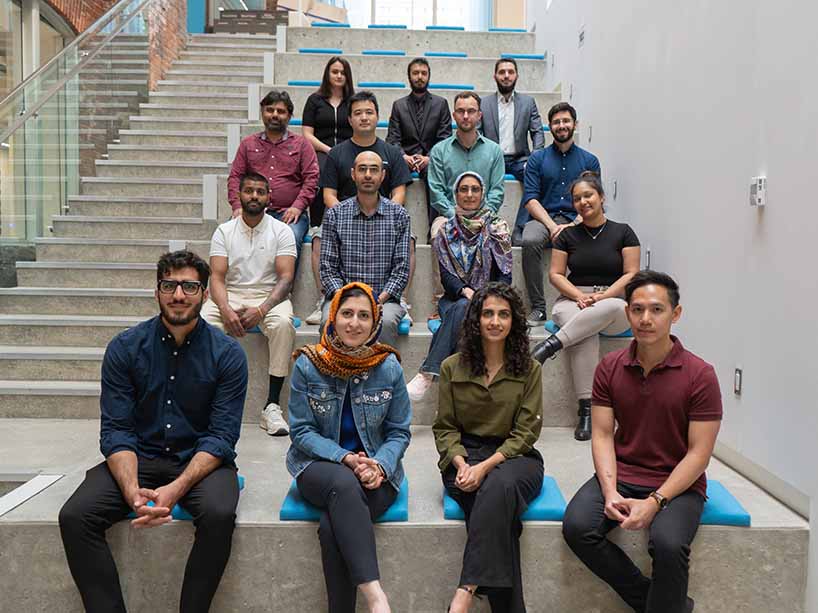National program helps students turn their scientific insights into viable ventures

David Raveenthrarajan (right, with Marc Adler) connected with distilleries across Ontario to determine how best to market spirits matured using organic chemistry principles.
When David Raveenthrarajan graduated from the TMU master’s of science program in 2022, he wasn’t sure how to apply what he had learned in organic chemistry to his future career. It wasn’t until his supervisor, Professor Marc Adler, sparked an idea.
“As I was thinking about what to do post-graduation, he reminded me of a project we discussed while I was in my master’s program,” says Raveenthrarajan. “I decided to put all my eggs in one basket.”
Raveenthrarajan and Adler identified an opportunity to speed up the process of making spirits – including rye based whisky-style products – from three years to about four months through organic chemistry principles. The resulting product could be made without overhead costs such as barrels and storage facilities, which was a game changer for distillers looking to maximize their profits.
In September 2022, Raveenthrarajan and Adler launched VI SIX (external link) , a company founded on this idea. Through participation in Lab2Market (external link) , a nationwide program that helps STEM students turn their passions into viable ventures, they launched several pilot programs with partner distilleries and recently struck a deal with Elora Distilling Company to produce both whisky and rum products.

At the Lab2Market Deeptech Expo in September 2023, teams competed in a pitch competition and received $7,000 in prizes. All of the teams from the Ontario Summer 2023 Lab2Market launch program (pictured here) pitched their ideas at the Expo.
Addressing a gap in the Canadian innovation ecosystem
Since Toronto Metropolitan University and Dalhousie University launched it three years ago, Lab2Market has helped more than 500 teams from 33 institutions across Canada raise more than $15 million in funding. The program was founded to address the specific needs of researchers who want to launch real-world projects in the Canadian innovation ecosystem.
“Canada continues to struggle with the commercialization of research and to effectively help researchers bring their projects to impact the economy and society,” said John MacRitchie, assistant vice-president of Zone Learning and strategic initiatives. “At TMU, we were able to develop Lab2Market by leveraging the startup support expertise developed through our Zones. Taking an open, national approach means we have the scale to deliver a high quality program and to make a larger impact on this challenge in Canada.”
One of those incubators, the Innovation Boost Zone (IBZ), has been involved with Lab2Market since the beginning and runs the program in Ontario as well as national programming with NSERC. The IBZ, an early-stage startup incubator that supports startups focused on technology solutions, empowers researchers to learn skills that allow them to apply their research in the real world. They worked with the other Lab2Market partner institutions to bring their Zone experience to the design and execution of the national Lab2Market program and its growing network.

Biofect Innovations harnesses the power of microbes to change the future of protein production. From left: Louis Lo, chief scientific officer; John Abousawan, head of business development; Teshager Kefale, chief technology officer; and Christian Delos Santos, CEO.
‘Advisors helped us every step of the way’
Christian Delos Santos, who finished his bachelor’s and PhD degrees at TMU, was worried that the research he was publishing wouldn’t have any real world applications. He founded Biofect Innovations (external link) with fellow TMU alumni John Abousawan and Louis Lo in December 2017 with one simple mission – to figure out how he can use his research to make peoples’ lives better.
Fast forward to 2021, the team did the four-month Lab2Market program (external link) and got $15,000 to figure out their path forward through a rigorous and data-driven customer discovery process.
“I was trying to get as much as I could from the Lab2Market program and actively validate our ideas,” said Delos Santos. “I was very happy to develop a network of advisors who were there to help us every step of the way.”
They landed on the idea to produce a protein, naturally found in West Africa, in the lab through a sustainable platform. The protein, called brazzein, has the potential to become the new alternative sweetener because it is 2000 times sweeter than sugar without the bitter aftertaste and risks of chemical-based sweeteners such as insulin spikes or potentially harmful byproducts.

Mark Aquilino wanted to create technology that could help people with disabilities.
Students interested from all over the country
Lab2Market has attracted students from 33 institutions as far as British Columbia and as close as the University of Toronto.
Mark Aquilino spent seven years at U of T studying biomedical engineering. He was looking for an opportunity to commercialize the kinds of technologies he was developing while pursuing his PhD and found Lab2Market.
The program, he says, was one of the best experiences he had in an accelerator. In 2021 he spent four months in the Lab2Market program learning how to take the scientific insights he learned as a PhD student and translate them into a commercial venture.
Lab2Market helped Aquilino co-found Epiloid Biotechnology (external link) , a contract research organization specializing in growing miniature human brain tissue that can recreate the function and many aspects of the human brain to test in the lab. The human tissue is a more sustainable and accurate alternative to using lab rats in clinical trials.
Looking to get involved in Zone Learning? Find out more on the website or talk to a Zone Navigator to get started.
Related stories:
